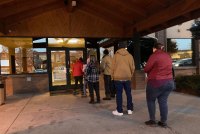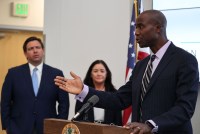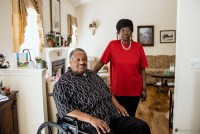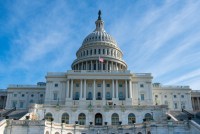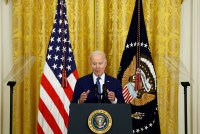Utah Survey Shows Why So Many People Were Dumped From Medicaid
It’s one of the biggest mysteries in health policy: What happened to millions of Americans kicked out of Medicaid last year? A survey conducted for state officials in Utah, obtained by KFF Health News, holds some clues. Like many states, Utah terminated Medicaid coverage for a large share of enrollees whose eligibility was reevaluated in […]
States Expand Health Coverage for Immigrants as GOP Hits Biden Over Border Crossings
More than 1 million immigrants, most lacking permanent legal status, are covered by state health programs. Several states, including GOP-led Utah, will soon add or expand such coverage.
La mayoría de los adultos sin papeles trabajan, representan aproximadamente el 5% de la fuerza laboral nacional, según el Pew Research Center.
Colorado culpa a Biden y a farmacéuticas por retrasar importaciones de medicamentos de Canadá
Los consumidores estadounidenses pagan algunos de los precios más altos del mundo por medicamentos de marca. En Canadá, el gobierno controla los precios.
Colorado Blames Biden Team and Drugmakers for Delaying Canadian Imports
Colorado officials say they haven’t been able to stand up a program to import drugs from Canada because of drugmaker opposition — and the Biden administration’s inaction.
Colorado Says Drug Industry Blocked Its Canada Dreams – And Biden Hasn’t Helped
Colorado’s leaders had grand plans to import cheaper medicines from Canada, after the Trump administration issued rules in 2020 allowing states to try it. But officials in Denver say they’ve been stymied by opposition from drugmakers — as well as the Biden administration’s inaction on the policy. That’s according to a Dec. 1 report we […]
1 in 3 People Dropped by Utah Medicaid Left Uninsured, a ‘Concerning’ Sign for Nation
About a third of the 130,000 people Utah has dropped from Medicaid this year say they now lack health insurance. It’s a glimpse into the fate of people caught up in Medicaid’s “unwinding.”
Biden Administration Nibbles at the Maternal Health Crisis
Choosing where to give birth typically comes down to what hospital is most convenient to your home, where your obstetrician practices and your insurance company’s provider network. Now, the Biden administration has given expectant parents another factor to consider: whether their hospital has won the government’s new “birthing friendly” designation. But don’t worry — a […]
“Peor de lo que la gente cree”, cambios en Medicaid crean caos en los estados
Tanto beneficiarios como defensores de pacientes dicen que los funcionarios de Medicaid enviaron formularios de renovación obligatoria a direcciones viejas, calcularon mal los niveles de ingresos e hicieron malas traducciones de los documentos.
‘Worse Than People Can Imagine’: Medicaid ‘Unwinding’ Breeds Chaos in States
As Medicaid programs across the nation review enrollees’ status in the wake of the pandemic, patients struggle to navigate the upheaval.
Smaller Employers Weigh a Big-Company Fix for Scarce Primary Care: Their Own Clinics
Company health clinics are most common at large workplaces, but some small employers say they see advantages, too: healthier workers, lower costs, and better access to primary care.
Quick Genetic Test Offers Hope for Sick, Undiagnosed Kids. But Few Insurers Offer to Pay.
A new, rapid genetic test shows promise in increasing diagnoses and improving treatment for some children with rare genetic conditions. Many insurers won’t cover it, but Florida’s Medicaid program is among those that see benefits — and, potentially, savings.
Pruebas genéticas rápidas a bebés pueden salvar vidas, pero muchas aseguradoras no las cubren
Que Medicaid cubra la prueba puede expandir significativamente el acceso para los bebés; el programa de salud federal gerenciado por los estados que asegura a las familias de bajos ingresos y que cubre a más del 40% de los niños en su primer año de vida.
Florida Gov. Ron DeSantis Injects Presidential Politics Into the Covid Vaccine Debate
Losing ground in the Republican primary, Gov. Ron DeSantis of Florida and his top medical advisers dismissed the recent federal recommendation that almost everyone get an updated covid shot.
Even in the Most Depressed County in America, Stigma Around Mental Illness Persists
An estimated 32% of adults in Logan County, West Virginia, have been diagnosed with depression, the highest rate in the United States, according to a recent CDC report.
His Anesthesia Provider Billed Medicare Late. He Got Sent to Collections for the $3,000 Tab.
Medicare was supposed to cover the entire cost of his procedure. But after the anesthesia provider failed to file its claims in a timely manner, it billed the patient instead.
Hospitals Ask Congress to Delay ACA Medicaid Funding Cuts — For the 14th Time
Congress has until October to avert cuts to a Medicaid program intended to support safety-net hospitals that, in practice, improves the bottom lines of other hospitals, too. Hospital leaders say now is not a good time for the cuts — which lawmakers have so far postponed 13 times.
Got Milk in School? Farmers Fight Health Advocates Over the Creamy ‘Whole’ Variety
It has been over a decade since whole milk was served in schools through the National School Lunch Program, after U.S. government dietary guidance effectively banned it. But dairy farmers, some health experts, and members of Congress say it’s time to bring it back.
How a 2019 Florida Law Catalyzed a Hospital-Building Boom
In Wesley Chapel, Fla., near Tampa, residents will soon have three general hospitals within a five-minute drive. The new construction is part of a hospital-building boom across Florida unleashed almost four years ago, when the state dropped a requirement that companies obtain government approval to open new hospitals.
Obamacare at 13: Biden and a KHN Reporter Remember
The White House gathered the people who helped pass the Affordable Care Act 13 years ago — partly to congratulate themselves but also to emphasize that they still have much work to do to make health care affordable.







